Carnegie Lecture Series
Carnegie Corporation of New York was established by Andrew Carnegie in 1911 “to promote the advancement and diffusion of knowledge and understanding”, a mission it continues to fulfil today by funding major programmes that further education, democracy and international peace.
To celebrate its centenary, the Corporation is funding a ten-year programme of public lectures at Scotland’s ancient universities: St Andrews, Aberdeen, Edinburgh and Glasgow. The programme will bring some of the world’s most important thinkers in the fields of the arts, sciences, education and international affairs to Scotland to engage with local audiences in a vibrant exchange of knowledge and ideas.
The University of St Andrews is grateful that Carnegie Corporation’s generous funding of this lecture series is allowing the University to open a new chapter in its long-standing relationship with Andrew Carnegie and the values he promoted.
About Andrew Carnegie
Andrew Carnegie (1835-1919) was not only one of the world’s greatest industrialists, but he was also one of the most prolific and influential philanthropists of the modern age. Appreciating that the accumulation of great wealth brought its own responsibilities, he sought to discharge those responsibilities by using his money for the social good. He was a passionate advocate of education and funded the creation of public libraries throughout the United States and around the world, allowing free access to knowledge and ideas that would encourage social and educational advancement for all. He also devoted time and money to initiatives that supported the arts, scientific research, world peace and the promotion of democracy.
Andrew Carnegie, who was born in Fife, was elected Rector of Scotland’s first university, St Andrews, in 1901, a position he held until 1907. At his rectoral installation in 1902, Andrew Carnegie spoke of his very great affection for St Andrews, “I am hereafter one more St Andrews man who will proclaim the indefinable charm under whose potent spell I now stand before you.” His affection manifested itself not just in his representation of the student body in his role of Rector, but in a number of very generous donations that he made to the University, including funds for a gymnasium, playing fields and an extension to the library. His foresight provided firm foundations on which the University’s success of the last 100 years has been built.
Previous Carnegie Lectures
-
Dr Renée Powell, Hon LLD – Thursday 20 March 2025

Professional golfer and educator Renée Powell is the second Black woman to play on the Ladies Professional Golf Association (LPGA) Tour and is the sport’s greatest living ambassador. Powell – the PGA Head Professional at Clearview Golf Club in East Canton, Ohio – is the first Black woman member of the PGA of America (1996). She is the first female golfer to receive an Honorary Doctor of Laws degree (2008) in the 600-year history of the University of St Andrews and in 2015 she was one of the first seven women named as Honorary Members of the 260-year-old Royal & Ancient Golf Club in St Andrews.
In 2018, the University of St Andrews named a new student hall of residence after Renée Powell – the first American to be honoured in such a way.
Powell is a past Director at Large of the Board of Directors of the PGA of America, and the founder of Clearview HOPE - the country’s unique, year round, cost-free golf rehabilitation programme specifically for women veterans.
Renée is the daughter of William Powell, the only Black man to design, build, own and operate a golf course in the United States. Mr Powell was inducted posthumously (2013) into the PGA of America Hall of Fame. Renée was inducted in 2017.
Renée meets regularly with Principal Sally Mapstone and this event was a conversation between them focused on Renée’s vision and life-story.
-
Patricia Hill Collins – Wednesday 9 October 2024
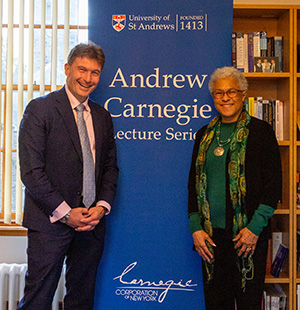
Patricia Hill Collins is distinguished university Professor Emerita of Sociology at the University of Maryland, College Park, and Charles Phelps Taft Professor Emerita of African American Studies at the University of Cincinnati.
Her books include Black Feminist Thought (1990, 2000, 2022); Fighting Words (1998); Black Sexual Politics (2004); From Black Power to Hip Hop (2005); Intersectionality (2016; 2020, co-authored with Sirma Bilge); Intersectionality as Critical Social Theory (2019), and Lethal Intersections: Race, Gender, and Violence (2024). Her anthology Race, Class, and Gender: Intersections and Inequalities, 11th ed. (2024), edited with Margaret Andersen, has been widely used for over 30 years in over 200 colleges and universities. Her books and articles have been translated into Portuguese, German, Italian, Korean, Japanese, Romanian, French, Spanish, and Turkish.
Professor Collins has held editorial positions with professional journals, lectured widely in the United States and internationally, served in many capacities in professional organisations, and has acted as consultant for community organisations.
In 2008, she became the 100th President of the American Sociological Association, the first African American woman elected to this position in the organisation’s 104-year history.
In 2022, she was elected as a member of the American Academy of Arts and Sciences, one of the oldest learned societies in the United States.
In 2023, she was awarded the prestigious Berggruen Prize for Philosophy and Culture, an award given annually to an individual whose ideas have profoundly shaped human self-understanding and advancement in a rapidly changing world.
-
Mark Sedwill, Baron Sedwill of Sherborne GCMG FRGS LLD – Tuesday 16 January 2024
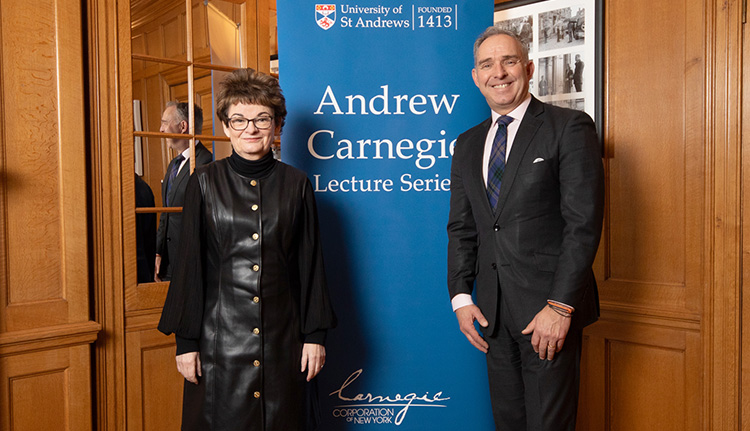
Lord Sedwill is a cross-bench member of the House of Lords. He chaired the 2021 G7 Panel on Global Economic Resilience and is Chair of the Atlantic Future Forum. He is Chair of Geopolitical Advisory and Saudi Arabia for Rothschild & Co and a non-executive director of Lloyd’s of London and BAE Systems.
Lord Sedwill was Cabinet Secretary & Head of the Civil Service (2018-20), National Security Adviser (2017-20), Permanent Secretary at the Home Office (2013-17), and British Ambassador and NATO Representative in Afghanistan (2009-11). Before that he had a diplomatic and security career serving in Egypt, Syria, Jordan, Cyprus and Pakistan.
Educated at St Andrews and Oxford Universities, Lord Sedwill is a Fellow of the Royal Geographical Society and of the Institute of Directors, an Honorary Fellow of Oxford University and of St Edmund Hall, Oxford. He is President of the Special Forces Club, a member of the IISS Advisory Council, a Trustee of the RNLI, an Honorary Colonel in the Royal Marines, an Honorary Doctor of Laws of St Andrews University, and an Honorary Bencher of Middle Temple. He is also the recipient of several awards and honours for national and international public service.
-
Sir Andrew Motion FRSL – Wednesday 1 November 2023
Andrew Motion read English at Oxford University where he won the Newdigate Prize and studied the work of Edward Thomas – an abiding influence. At Hull University he taught English and worked alongside Philip Larkin, another acknowledged mentor, whose official biographer he later became. Motion edited the Poetry Review, before becoming Poetry Editor at Chatto and Windus and, from 1996, Chair of the Arts Council of England’s Literature Panel. From 1995 to 2003 he was Professor of Creative Writing at the University of East Anglia, and from 2003 to 2015 he held the same position at Royal Holloway College, University of London. In 1999 he was appointed UK Poet Laureate, serving until 2009 as a high-profile champion of poetry as well as Founder/Director of the Poetry Archive to 2016.
The figure of the soldier appears in many of his poems; Motion has spent time with those who have served in wars from WWII to more recently in Afghanistan, and with their loved ones, bearing witness in his writing to their experiences of death and survival. His deep, campaigning interest in protecting the landscape and the environment form important themes in his poems and have also been given voice in his work for the Campaign to Protect Rural England, where he served as President from 2008 to 2016.
Andrew Motion’s own writing stands alongside his commitment to education and to making poetry accessible to all. ‘Poetry by Heart’ – the national competition he co-founded as part of the Archive – has inspired hundreds of school-aged young people across the UK to learn and recite poetry. Motion is also the author of two novels for young adults, Silver and The New World, both riffs on Treasure Island by Robert Louis Stevenson.
His awards include The Mail on Sunday/John Llewellyn Rhys Prize, the Dylan Thomas Award, the Somerset Maughan Award and the Whitbread Biography Award. He was knighted for his services to literature in the Queen’s Birthday Honours 2009. That same year, his biography of John Keats became the basis for the Cannes Film Festival Palme D’Or nominated film ‘Bright Star’, directed by Jane Campion.
Andrew Motion now lives in Baltimore, USA, where he is currently Homewood Professor of the Arts at Johns Hopkins University.
-
Jack Halberstam - Monday 6 February 2023
Professor Jack Halberstam is the David Feinson Professor of Humanities; Director of the Institute for Research on Women, Gender and Sexuality; and Professor of Gender Studies and English at Columbia University.
Halberstam is the author of seven books including: Skin Shows: Gothic Horror and the Technology of Monsters (Duke UP, 1995), Female Masculinity (Duke UP, 1998), In A Queer Time and Place (NYU Press, 2005), The Queer Art of Failure (Duke UP, 2011), Gaga Feminism: Sex, Gender, and the End of Normal (Beacon Press, 2012) and Trans*: A Quick and Quirky Account of Gender Variance (University of California Press). Halberstam’s most recent book is Wild Things: The Disorder of Desire (Duke UP, 2020). Halberstam is now finishing a second volume on wildness titled: Unworlding: An Aesthetics of Collapse.
Places Journal awarded Halberstam its Arcus/Places Prize in 2018 for innovative public scholarship on the relationship between gender, sexuality and the built environment.
Halberstam was recently the subject of a short film titled “So We Moved” by Adam Pendleton, which played at the Museum of Modern Art in New York City until early 2022.
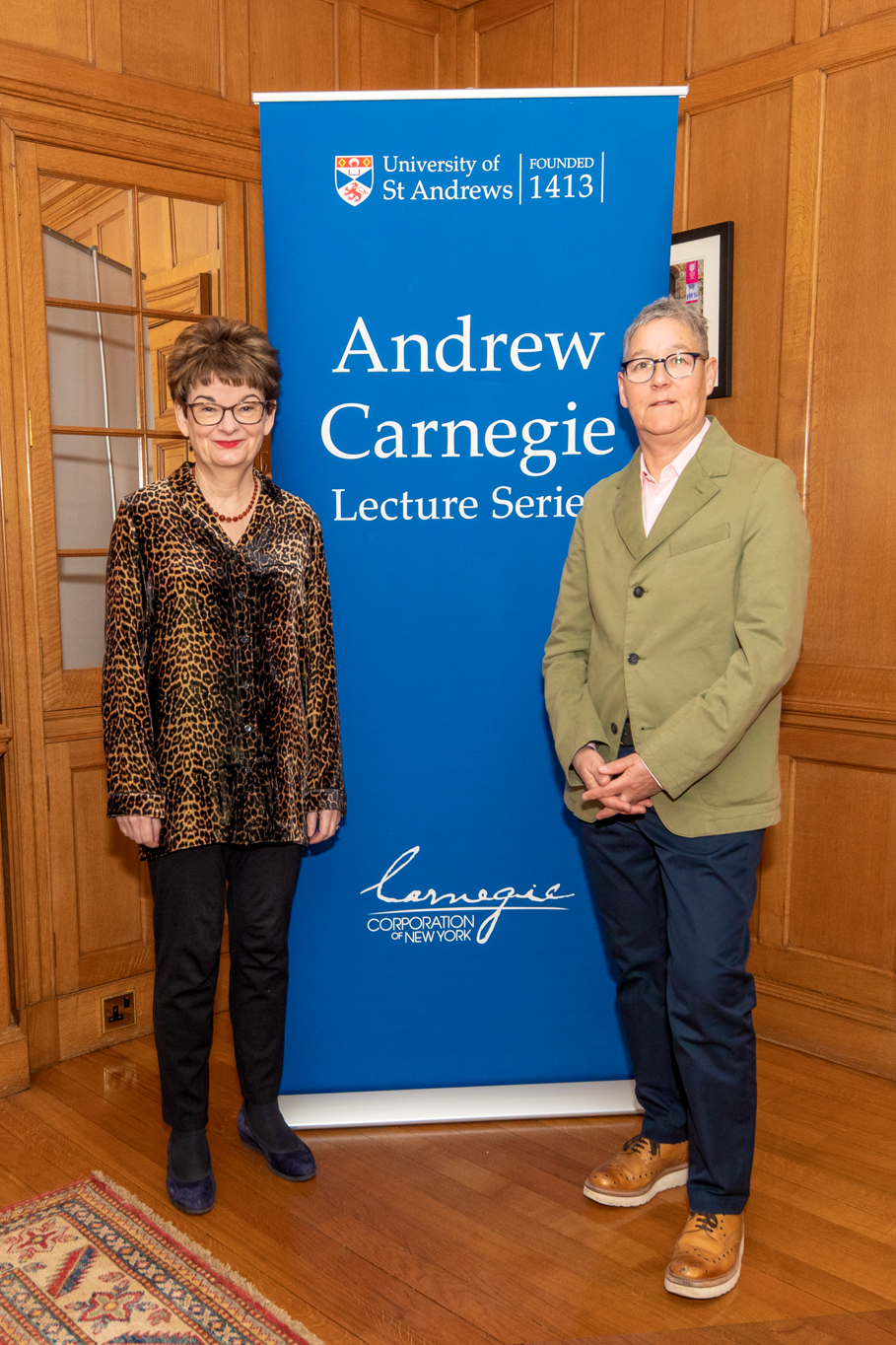
-
Adam Sisman – Tuesday 19 April 2022
Adam Sisman is one of the UK’s most distinguished biographers and editors.
Adam Sisman read History at the University of Sussex before embarking upon an editorial career in the publishing industry, working at Oxford University Press, Blackwell, Allen & Unwin, and latterly Macmillan where he served as Editorial Director.
Sisman simultaneously came into his own as a writer, globally respected for the authoritative quality of his research and his adroit and candid approach to the life writing of figures both from past centuries and from our contemporary world. His first book, A. J. P. Taylor: A Biography, was shortlisted for the Duff Cooper Prize. He has authored five further books, including Boswell’s Presumptuous Task: the Making of the Life of Dr Johnson in 1999 which won the American National Book Critics Circle Award for Biography, and John le Carré: The Biography, published in 2015. Sisman has also published two edited collections of the letters of Patrick Leigh Fermor, and he co-edited selected letters of Hugh Trevor-Roper in 2013, having also published the first biography of Trevor-Roper in 2010.
As an honorary fellow of the University of St Andrews, he has previously lectured in St Andrews on biographical writing and has taken a day long seminar on A. J. P. Taylor’s The Struggle for the Mastery of Europe. We are honoured to welcome Adam Sisman to deliver the latest instalment in the Andrew Carnegie Lecture Series.
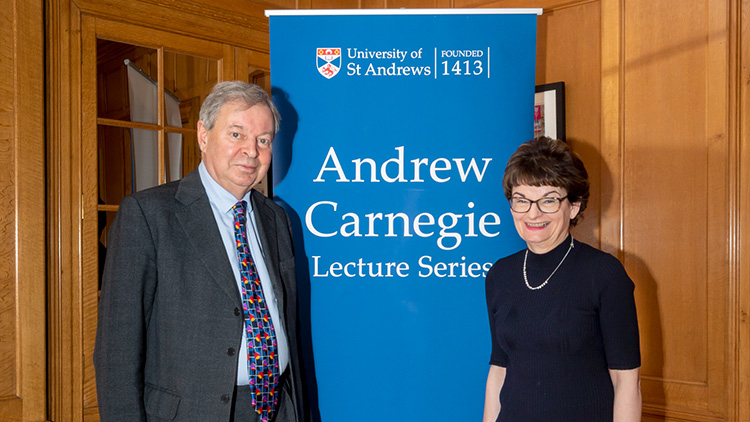
-
Dr Lyse Doucet OBE CM – Tuesday 18 February 2020
Lyse Doucet is the BBC’s award-winning Chief International Correspondent and a senior presenter who anchors news programmes for BBC World News television and BBC World Service radio. She is regularly deployed to present special news coverage from the field, interview world leaders and report across the BBC’s global and domestic outlets.
She is a regular visitor to the Middle East and has covered major stories in the region since 1994, when she established the BBC’s office in Amman, Jordan.
Lyse was nominated to the Order of Canada in 2018 and received an OBE in the Queen’s Honours list in 2014 for her services to broadcasting.
Her most recent awards include the 2018 Trailblazer Award from the Georgetown Institute for Women, Peace and Security in Washington D.C. and a #ChangeTheCulture award from Their World, a global children’s charity.
In 2017 Lyse was honoured with the Charles Wheeler Award for Outstanding Contribution to Broadcast Journalism by the British Journalism Review. She was also awarded Italy’s Luchetta Prize for a report on Syrian children and the Next Century Foundation Award for Outstanding Contribution to Broadcasting. In 2016 she received the Sandford St Martin Trustees’ Award for raising the profile of religion in the media and the Columbia School of Journalism Award for exceptional journalist achievement. Lyse’s team was part of the BBC team which received an Emmy award for coverage of Syria. In 2015 she won One World Media’s Radio Award for a documentary on Afghan women.
Born in eastern Canada, Lyse has twelve honorary doctorates from leading British and Canadian Universities. She has a Masters degree in International Relations from the University of Toronto, and a BA Hons from Queen’s University in Kingston.
She is a Senior Fellow of Massey College at the University of Toronto, a trustee of the Intermediate charity for mediation and negotiation, an honorary patron of Canadian Crossroads International and a member of Friends of Aschiana UK which supports working street children in Afghanistan. She is also a founding member of the Marie Colvin Journalists’ Network, a Trustee of the Frontline Club for Journalists and a member of the Canadian Journalism Forum on Violence and Trauma.
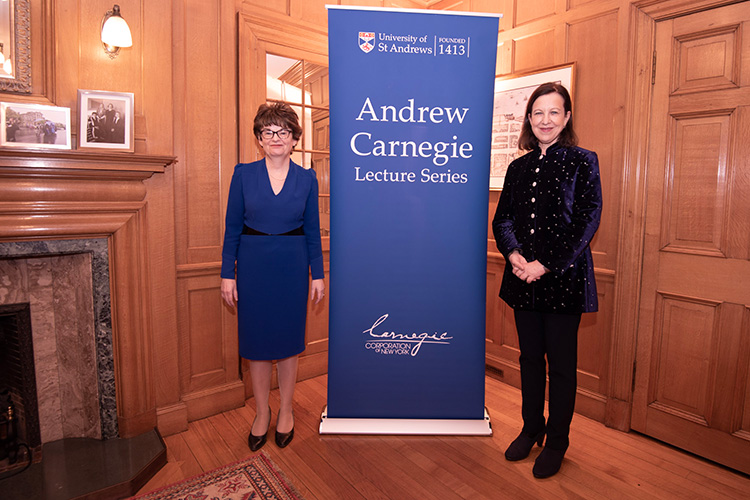
-
Professor Bruce Hoffman – Thursday 7 November 2019
Bruce Hoffman has been studying terrorism and insurgency for over four decades. He is a professor at Georgetown University’s Walsh School of Foreign Service and the Shelby Cullom and Kathryn W Davis Visiting Senior Fellow for Counterterrorism and Homeland Security at the Council on Foreign Relations. He is also the George H Gilmore Senior Fellow at the US Military Academy’s Combating Terrorism Center.
Hoffman previously held the Corporate Chair in Counterterrorism and Counterinsurgency at the RAND Corporation and was co-founder and the first Director of the University of St Andrews Centre for the Study of Terrorism and Political Violence, where he is currently visiting Professor of Terrorism Studies.
He was appointed a commissioner on the 9/11 Review Commission by the US Congress and has been Scholar-in-Residence for Counterterrorism at the Central Intelligence Agency; adviser on counterterrorism to the Coalition Provisional Authority, Baghdad, Iraq and adviser on counterinsurgency to Multi-National Forces-Iraq Headquarters, Baghdad, Iraq. He is a recipient of the United States Intelligence Community Seal Medallion – the highest level of commendation given to a non-government employee.
Hoffman is the author of the award-winning book Anonymous Soldiers (2015). His most recent books include Inside Terrorism (3rd edition, 2017) – cited as one of the 25 most notable books published by Columbia University Press on the occasion of its 125th anniversary – and The Evolution of the Global Terrorist Threat (2014).
Hoffman holds degrees in government, history, and international relations and received his doctorate from Oxford University.
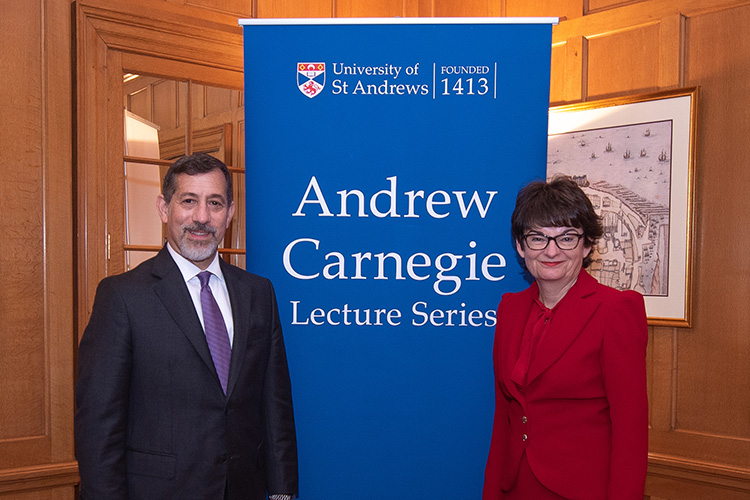
-
David Nott OBE – Tuesday 8 October 2019
David Nott graduated in 1979 from the University of St Andrews with a BSc in Medicine, before heading to Manchester to study for his MB ChB.
While at St Andrews he was president of the Bute Medical Society and a rugby team captain. He was also involved with the students’ Charities Campaign.
Now a leading war-zone surgeon, David Nott received an OBE in 2012 for his medical work in war regions. In 2016 he worn the Robert Burns Humanitarian Award and a Pride of Britain Award for his work in Syria.
Since leaving St Andrews, he has dedicated much of his career to working as a war-zone surgeon, and has set up the David Nott Foundation to make his skills and experience as widely available as possible within this context:
“When I arrived in St Andrews in 1975 to study medicine, little did I know where my studies would take me. For the past 26 years I have travelled around the world treating patients with various aid agencies. Since 2011, I have sought to give back the knowledge I have of war surgery in the countries I visit. I started this in Libya and have since taught in Syria, Turkey and Yemen. I set up my own charity, the David Nott Foundation, for the purpose of raising money to continue and expand this training.
“The David Nott Foundation is the medium through which I want to capture and record all my years’ experience in operating, teaching and training, in Syria and beyond, and make it available to the brave doctors who around the world are striving to save those affected by conflict and catastrophe. Through training courses in the UK and abroad, and using the best of new technology, we want to reach as many as we can and let the doctors know that help is at hand.”
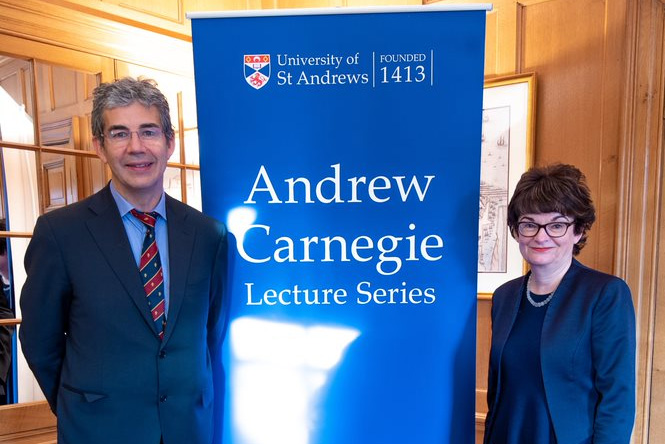
-
Sir Jonathan Mills - Thursday 6 December 2018
Sir Jonathan Mills AO is a prominent Australian-born composer and festival director, who resides in the UK. In the 1990s he worked in the Architecture Faculty of RMIT University in Melbourne, leading courses in acoustic design. He is the composer of several award-winning operas and works for chamber ensemble and orchestra. His opera Eternity Man was recognised by a Genesis Foundation commission in 2003 and his oratorio Sandakan Threnody won the Prix Italia in 2005.
He has been director of various music and multi-arts festivals in Australia and also in the UK, where he was the director of the Edinburgh International Festival between 2007 and 2014.
He is currently Director of the Edinburgh International Culture Summit, a UNESCO-recognised biennial meeting held in conjunction with Edinburgh’s summer festivals and is the current President of the EFFE International Jury. EFFE (Europe for Festivals, Festivals for Europe) was initiated by the European Festivals Association.
Jonathan is Visiting Professor at the University of Edinburgh and at Yale University. He is also Vice Chancellor’s (Professorial) Fellow at the University of Melbourne.
His work has been recognised by awards from the governments of Australia, Britain, France, Poland and South Korea.
His opera Eucalyptus based on Murray Bail’s novel has been commissioned by Opera Australia for performances in 2020 and 2021.
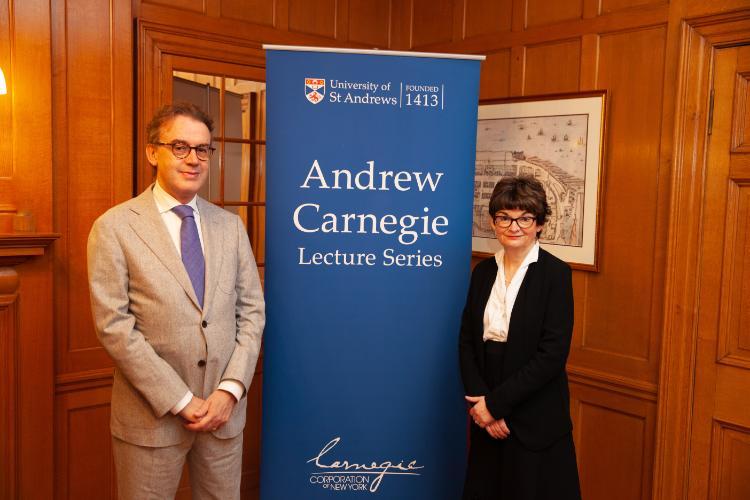
Professor Sally Mapstone and Sir Jonathan Mills. -
Dr Maria Klawe - Wednesday 30 March 2016
Over the past decade, the participation of females in the tech industry has declined rather than advanced. This is unfortunate for young women because of the incredible career opportunities, for the tech industry because of the loss of incoming talent, and for society because of the loss of diversity of perspective among tech teams. I will talk about how we can improve the situation and how Harvey Mudd College dramatically increased the number of females majoring in computer science, from 10% of the majors to over 40%.
Maria Klawe became Harvey Mudd College’s fifth president in 2006. A renowned mathematician, computer scientist and scholar, Klawe is the first woman to lead the College since its founding in 1955. Prior to joining Harvey Mudd, she served as dean of engineering and professor of computer science at Princeton University. Klawe has made significant research contributions to and held numerous leadership roles in the areas of mathematics and computer science. Maria received her PhD (1977) and BSc (1973) in mathematics from the University of Alberta.
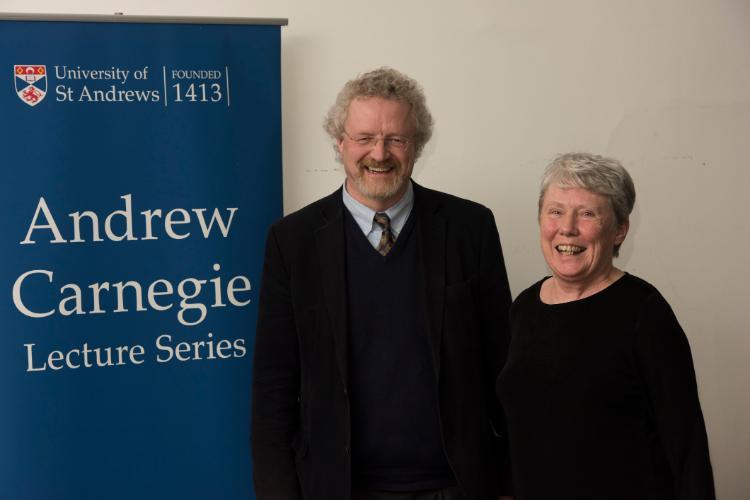
Professor Garry Taylor and Dr Maria Klawe. -
Dr Daniel Goldhagen - Monday 27 April 2015
Why is there so much anti-Semitism in the world? Why is it on the rise? Why are sober people, Jews and non-Jews, around Europe, including in the UK, sounding the alarm and conveying that Jews face such peril in their own local and national communities that there may not be a future for them in their countries?
anti-Semitism is at once the world’s most widespread prejudice and its most contested. And perhaps its most curious, as this historically weak and marginal people, numerically small, has been the object of so much animus, where they have lived and in places where they have not lived. Today, so many people think ill about, and wish ill upon, Jews, whether it is the Jews of Israel, Europe or the United States. And yet so many people deny that such thoughts and desires are a form of prejudice called anti-Semitism. How do we make sense of all this?
To understand contemporary anti-Semitism, we need to recognise that in our global age, it too has been globalised. Today’s global anti-Semitism is an obvious continuation of previous forms of anti-Semitism, yet its features are markedly different from the anti-Semitisms of earlier eras, making it something fundamentally new and historically unprecedented both among anti-Semitisms and in the annals of prejudice.
Daniel Jonah Goldhagen, prize-winning and bestselling author, former political science professor at Harvard, and author of The Devil that Never Dies: The Rise and Threat of Global anti-Semitism, will explore these and other themes about this age-old and this brand-new phenomenon that has fascinated, preoccupied, troubled and befuddled Jews and non-Jews alike and which has led to so much violence in the past and threatens so much violence in the present.
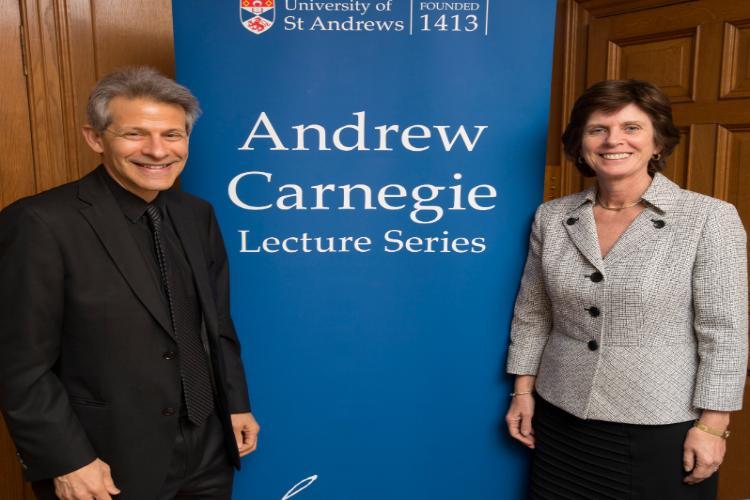
Dr Daniel Goldhagen and Professor Louise Richardson. -
Professor John Grotzinger - Monday 29 September 2014
Professor Grotzinger, a member of the National Academy of Sciences, is an internationally acclaimed geologist whose research is concerned with the evolution of surface environments on Earth and Mars. He is currently the Project Scientist for the Mars Science Laboratory mission and also a member of the Mars Exploration Rover Science Team and the HiRISE (High-Resolution Science Experiment) team on Mars Reconnaissance Orbiter.
His work as a field geologist addressing the chemical development of the early oceans and atmosphere on Earth has directly informed his work on the Mars Science Laboratory mission, whose Curiosity rover has been exploring the Red Planet since 2012, gaining insights into how water was involved in the early history of Mars. The Mars Exploration Rover is the first mission to conduct ground-based exploration of the bedrock geology of another planet and has resulted in the discovery of sedimentary rocks formed in aqueous depositional environments.
Professor Grotzinger received his BS in Geoscience from Hobart College in 1979, an MS in Geology from the University of Montana in 1981, and a PhD in Geology from Virginia Polytechnic Institute and State University in 1985. Since 2005, he has been based at Caltech (California Institute of Technology), where he is the Fletcher Jones Professor of Geology. He has received many prestigious awards for his ground-breaking research and, in September 2014, was named the new Chair of the Division of Geological and Planetary Sciences at Caltech.
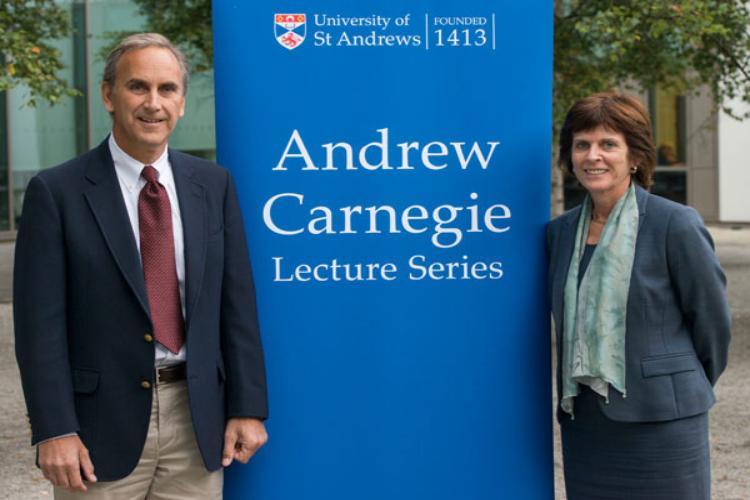
Professor John Grotzinger and Professor Louise Richardson. -
Professor Michael Sandel - Monday 28 April 2014
Professor Michael Sandel is the Anne T and Robert M Bass Professor of Government at Harvard University, where he has taught political philosophy since 1980. His ground-breaking course Justice has now captivated more than 15,000 students worldwide and is the first Harvard course to be made freely available online and on public television. Having been described in the media as “the most relevant living philosopher”, “the most effective communicator of ideas in English”, a “rock-star moralist”, and “the most famous teacher of philosophy in the world”, Michael Sandel is widely recognised as one of the greatest philosophical thinkers of his generation.
His latest book, What Money Can’t Buy: The Moral Limits of Markets takes on one of the biggest ethical questions of our time; what should be the role of money and markets in our society? Reviewers have called it “a brilliant, indispensable book on the relationship between morality and economics,” and “one of the most important exercises in public philosophy in many years”.
Sandel was recognised by the American Political Science Association in 2008 for a career of excellence in teaching and was also awarded the Harvard-Radcliffe Phi Beta Kappa Teaching Prize. He has been a visiting professor at the Sorbonne (Paris), delivered the Tanner Lectures on Human Values at Oxford University, and in 2009 delivered the BBC Reith Lectures. He now presents an ongoing series for BBC Radio 4 called The Public Philosopher. In 2010, China Newsweek named Sandel “the most influential foreign figure of the year”.
Sandel received his doctorate from Oxford University (DPhil1981), where he was a Rhodes Scholar.
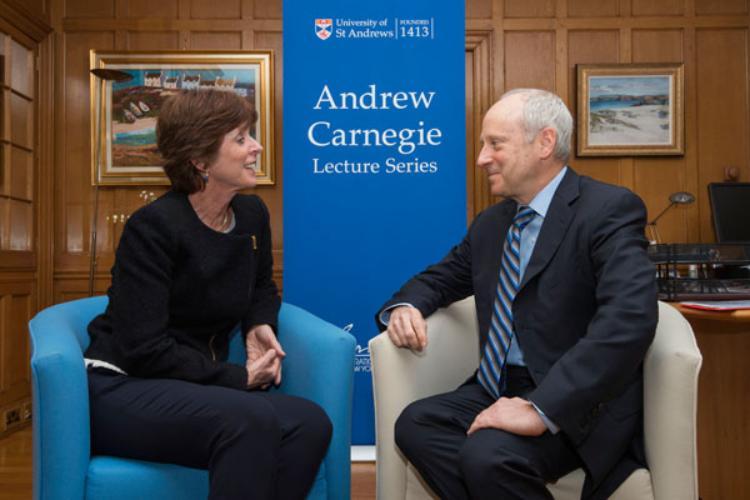
Professor Louise Richardson and Professor Michael Sandel.